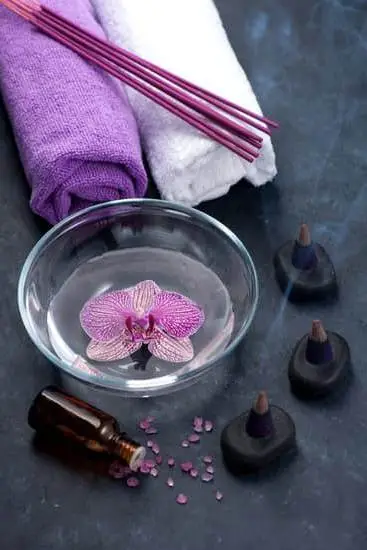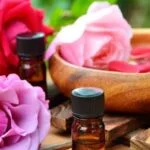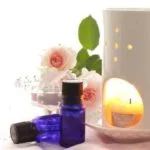Aromatherapy has been used for centuries as a natural way to promote health and well-being. But how does aromatherapy work? This article will delve into the history, science, and benefits of aromatherapy, as well as different methods of application and specific health conditions it can help with.
From ancient times to modern day, aromatherapy has been used in various cultures around the world for its therapeutic effects. Understanding the properties of essential oils is crucial to unlocking the potential of aromatherapy. We will explore the origins and evolution of aromatherapy, as well as how essential oils are extracted and their specific properties.
The science behind aromatherapy is fascinating – it involves the interaction between aromatic compounds in essential oils and receptors in the brain and body. We will delve into how these compounds work on a physiological level to produce therapeutic effects, such as stress relief, improved sleep, and enhanced mood. So, let’s take a deep dive into the world of aromatherapy to uncover its secrets and benefits.
The History of Aromatherapy
Aromatherapy has a rich and fascinating history that dates back to ancient civilizations. The use of aromatic plant extracts for medicinal and therapeutic purposes can be traced back to the ancient Egyptians, Greeks, Romans, and Chinese. In fact, essential oils were highly prized in these cultures for their healing properties and were often used in religious ceremonies, beauty treatments, and as part of traditional medicine practices.
Throughout history, aromatherapy has evolved and adapted to different cultural practices and beliefs. In the Middle Ages, essential oils were used to combat the spread of infectious diseases, while in the 17th century, aromatic plants were cultivated for their fragrance and therapeutic benefits in Europe.
During the 20th century, French chemist René-Maurice Gattefossé coined the term “aromatherapy” after he accidentally discovered the healing properties of lavender oil when he applied it to a burn on his hand. This groundbreaking moment sparked scientific interest in the field of aromatherapy and led to further research on the effects of essential oils on both physical and emotional well-being.
Today, aromatherapy continues to be an important aspect of holistic health and wellness practices around the world. It has gained popularity as a natural way to promote relaxation, relieve stress, improve sleep quality, enhance mood, and alleviate certain health conditions. With its enduring legacy from ancient times to modern day, aromatherapy remains a valuable tool for maintaining overall health and well-being.
- List item 1
- List item 2
- List item 3
Understanding Aromatherapy Oils
Aromatherapy oils, also known as essential oils, are the foundation of aromatherapy practice. These oils are highly concentrated plant extracts that have been used for centuries for their therapeutic and medicinal properties. Essential oils are derived from various parts of plants, including flowers, leaves, bark, and roots, and each type of oil has its unique properties and benefits.
Some popular essential oils used in aromatherapy include lavender, peppermint, eucalyptus, tea tree, and chamomile. Each essential oil has its own distinct aroma and therapeutic effects. For example, lavender oil is known for its calming and relaxing properties, while eucalyptus oil is often used to ease respiratory issues.
To understand how essential oils work in aromatherapy, it’s important to consider their chemical composition. Essential oils contain compounds that can interact with the body when inhaled or applied topically. These compounds can have a direct effect on the brain and nervous system, influencing mood, emotions, and physiological responses.
In addition to their aromatic properties, essential oils also possess antimicrobial, anti-inflammatory, and antioxidant properties. When used appropriately under the guidance of a trained aromatherapist or healthcare professional, these natural plant extracts can support overall well-being and promote a sense of balance and harmony within the body and mind.
Key benefits of incorporating essential oils into your daily routine:
- Support mental clarity and focus
- Aid in relaxation and stress reduction
- Improve sleep quality
- Alleviate headaches
- Ease digestive discomforts
- Boost immune function
Whether you’re new to aromatherapy or a seasoned enthusiast, understanding the unique properties of essential oils can help you choose the right oils for your individual needs. When using essential oils at home or in professional settings such as spas or wellness centers, it’s important to follow safety guidelines for proper dilution rates and methods of application to ensure safe usage for everyone.
The Science Behind Aromatherapy
Aromatherapy is a holistic healing treatment that uses natural plant extracts to promote health and well-being. The practice of aromatherapy has been used for centuries, but its scientific mechanisms have only recently been studied and understood. In this section, we will explore the science behind aromatherapy and how it works on the brain and body.
Understanding the Olfactory System
One of the key ways in which aromatherapy works is through the olfactory system. When essential oils are inhaled, they travel through the nose and directly stimulate the olfactory nerve. This nerve has a direct pathway to the limbic system in the brain, which is responsible for emotions, memories, and arousal. This direct connection is why certain scents can trigger strong emotional responses or memories.
Effects on Brain Chemistry
The chemical compounds in essential oils can also have an impact on brain chemistry. For example, some essential oils contain molecules that can interact with neurotransmitters like serotonin or dopamine, which are known to affect mood and stress levels. When these compounds are inhaled or absorbed through the skin, they can have a direct impact on brain function.
Physical Effects on the Body
In addition to its effects on the brain, aromatherapy also has physical effects on the body. When essential oils are applied topically or ingested (in some cases), their chemical compounds can be absorbed into the bloodstream and have systemic effects. For example, certain oils have been found to have anti-inflammatory or analgesic properties when applied to the skin.
Different Methods of Aromatherapy
Aromatherapy is the practice of using natural plant extracts, known as essential oils, to promote physical and psychological well-being. One might wonder, how does aromatherapy work? The science behind aromatherapy lies in the effect of these essential oils on the brain and body. When inhaled or applied to the skin, these aromatic compounds can trigger changes that positively impact emotions and overall health.
Inhalation is one of the most common methods of aromatherapy. When essential oils are inhaled through the nose, they can stimulate the olfactory system, which sends a signal to the brain’s limbic system – the area that controls emotions and memories.
This can lead to a release of chemicals such as serotonin, which can help to improve mood and reduce stress. Additionally, inhaling essential oils can also have a direct physical effect on the body by promoting relaxation and relieving respiratory issues.
Topical application involves diluting essential oils with a carrier oil and applying them directly to the skin. The molecules present in these oils are small enough to penetrate the skin barriers and enter into the bloodstream, where they can exert their therapeutic effects on various systems of the body. For example, lavender oil applied topically has been shown to have a calming effect on both mind and body.
Diffusion is another popular method used in aromatherapy, where essential oils are dispersed into the air using diffusers or nebulizers. This allows for easy inhalation of these aromatic compounds for therapeutic purposes. Depending on the specific oil being diffused, this method can serve as an effective way to purify the air, create a relaxing atmosphere at home or work, or even boost cognitive function.
Based on scientific research and centuries-old traditions alike, it’s clear that aromatherapy works through these different methods by interacting with our senses and influencing physiological mechanisms within our bodies.
| Method | Effects |
|---|---|
| Inhalation | Stimulation of olfactory system leading to improved mood and reduced stress; physical effects like relaxation and improved respiration |
| Topical Application | Penetration into bloodstream leading to therapeutic effects such as calming or pain relief |
| Diffusion | Purification of air; creation of relaxing atmosphere; boosting cognitive function |
Benefits of Aromatherapy
Aromatherapy has been used for centuries as a natural way to promote physical and emotional well-being. The use of aromatic plant extracts, also known as essential oils, is believed to have therapeutic properties that can help alleviate stress, improve sleep, and enhance mood. But how does aromatherapy work to achieve these benefits?
Essential oils used in aromatherapy are highly concentrated plant extracts that contain volatile compounds. When inhaled or applied to the skin, these compounds are absorbed into the bloodstream and travel to the brain, where they can exert their effects on the central nervous system. Research suggests that certain essential oils can act on neurotransmitters in the brain, such as serotonin and dopamine, which play a role in regulating mood and emotions.
In addition to their effects on the brain, essential oils also have physiological effects on the body. For example, some oils have been shown to have sedative properties that can promote relaxation and improve sleep quality. Other oils have anti-anxiety and stress-reducing effects that can help calm the mind and reduce feelings of tension.
| Benefits of Aromatherapy | Effects |
|---|---|
| Stress Relief | Promotes relaxation and reduces tension |
| Sleep Improvement | Sedative properties promote better sleep quality |
| Mood Enhancement | Acts on neurotransmitters in the brain to regulate mood and emotions |
Aromatherapy for Specific Health Conditions
Headaches
Aromatherapy can be an effective natural remedy for headaches. Certain essential oils such as peppermint and lavender have been shown to provide relief from tension headaches and migraines. When inhaled or applied topically, these oils can help to reduce the severity and frequency of headaches. Peppermint oil contains menthol, which has a cooling effect that can relax muscles and ease pain. Lavender oil, on the other hand, has calming and soothing properties that can alleviate stress-related headaches.
Anxiety
For those dealing with anxiety, aromatherapy can offer a sense of calm and relaxation. Essential oils like chamomile, bergamot, and ylang-ylang are known for their ability to promote relaxation and reduce symptoms of anxiety. These oils can be diffused in the air or added to a warm bath to create a peaceful environment. The aroma of these oils stimulates the olfactory system which then sends signals to the brain, promoting feelings of relaxation and tranquility.
Respiratory Issues
Aromatherapy can also be beneficial for individuals with respiratory issues such as asthma or allergies. Eucalyptus oil is commonly used to clear nasal passages and support respiratory function. When inhaled through steam inhalation or a diffuser, eucalyptus oil helps to open up the airways and relieve congestion.
Additionally, tea tree oil has antimicrobial properties that can help fight off respiratory infections and promote overall respiratory health. The use of these essential oils has been shown to improve breathing and alleviate symptoms associated with respiratory conditions.
Incorporating aromatherapy into your daily routine by using these essential oils can provide relief from headaches, anxiety, and respiratory issues through the powerful effects they have on the brain and body.
How to Incorporate Aromatherapy Into Your Daily Routine
In conclusion, aromatherapy is a practice that has been utilized for centuries and continues to be an effective way to promote overall well-being. Understanding the history of aromatherapy and the properties of essential oils can provide insight into how this practice has evolved from ancient times to modern day. Incorporating different methods of aromatherapy such as inhalation, topical application, and diffusion can offer various benefits including stress relief, improved sleep, and enhanced mood.
The science behind how aromatherapy works on the brain and body is an important aspect to consider when incorporating it into your daily routine. By understanding the mechanisms through which essential oils interact with our senses and nervous system, we can better appreciate the impact it has on our overall health. Additionally, exploring specific health conditions that can benefit from aromatherapy such as headaches, anxiety, and respiratory issues can provide targeted relief for individuals seeking natural remedies.
For those interested in integrating aromatherapy into their daily lives, there are various tips and tricks for maximum effectiveness. Whether it’s creating a calming atmosphere with diffusers or utilizing massage oils for relaxation, finding ways to incorporate aromatherapy into your routine can enhance its benefits.
Overall, the practice of aromatherapy offers a holistic approach to wellness that has stood the test of time and continues to provide support for individuals looking for natural ways to improve their physical and mental health.
Frequently Asked Questions
What Is the Process of Aromatherapy?
Aromatherapy involves using essential oils from plants to promote overall well-being. These oils can be inhaled, applied topically, or used in massages. The process typically begins with identifying the individual’s needs and choosing the appropriate essential oils.
Does Aromatherapy Really Help?
Many people find that aromatherapy helps them relax, manage stress, and improve their mood. Certain essential oils have been shown to have calming or energizing effects, depending on the person’s needs. While it may not be a cure-all, many individuals find it beneficial for their mental and emotional well-being.
How Does Aromatherapy Work in the Brain?
Aromatherapy works in the brain through the olfactory system. When essential oils are inhaled, the scent molecules travel through the nasal passages and stimulate the olfactory receptors. These receptors then send signals to the limbic system, which is involved in emotions, memory, and behavior. This can result in mood changes or relaxation based on the specific essential oil being used.

Are you looking for a natural way to improve your health and wellbeing?
If so, aromatherapy may be the answer for you.





